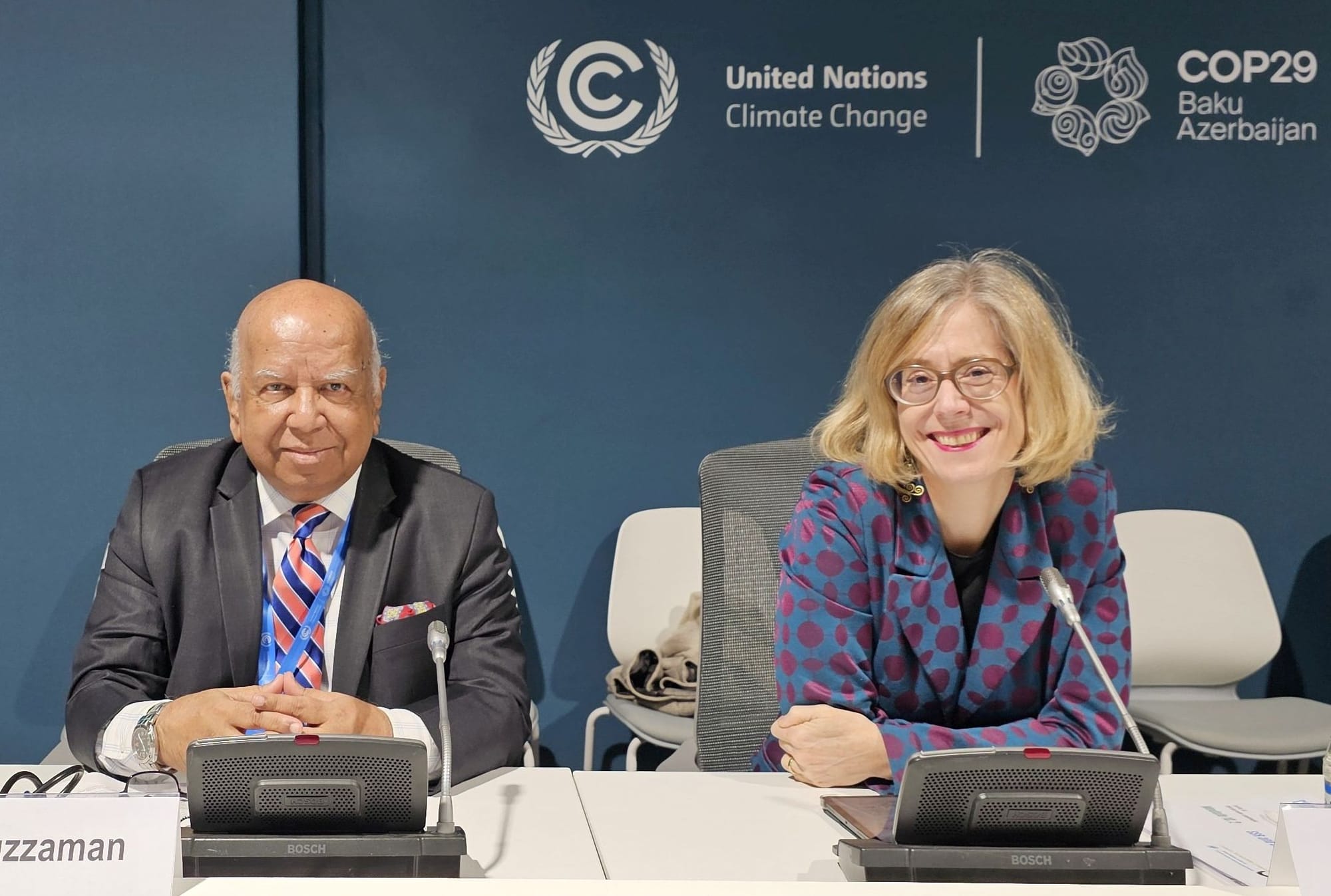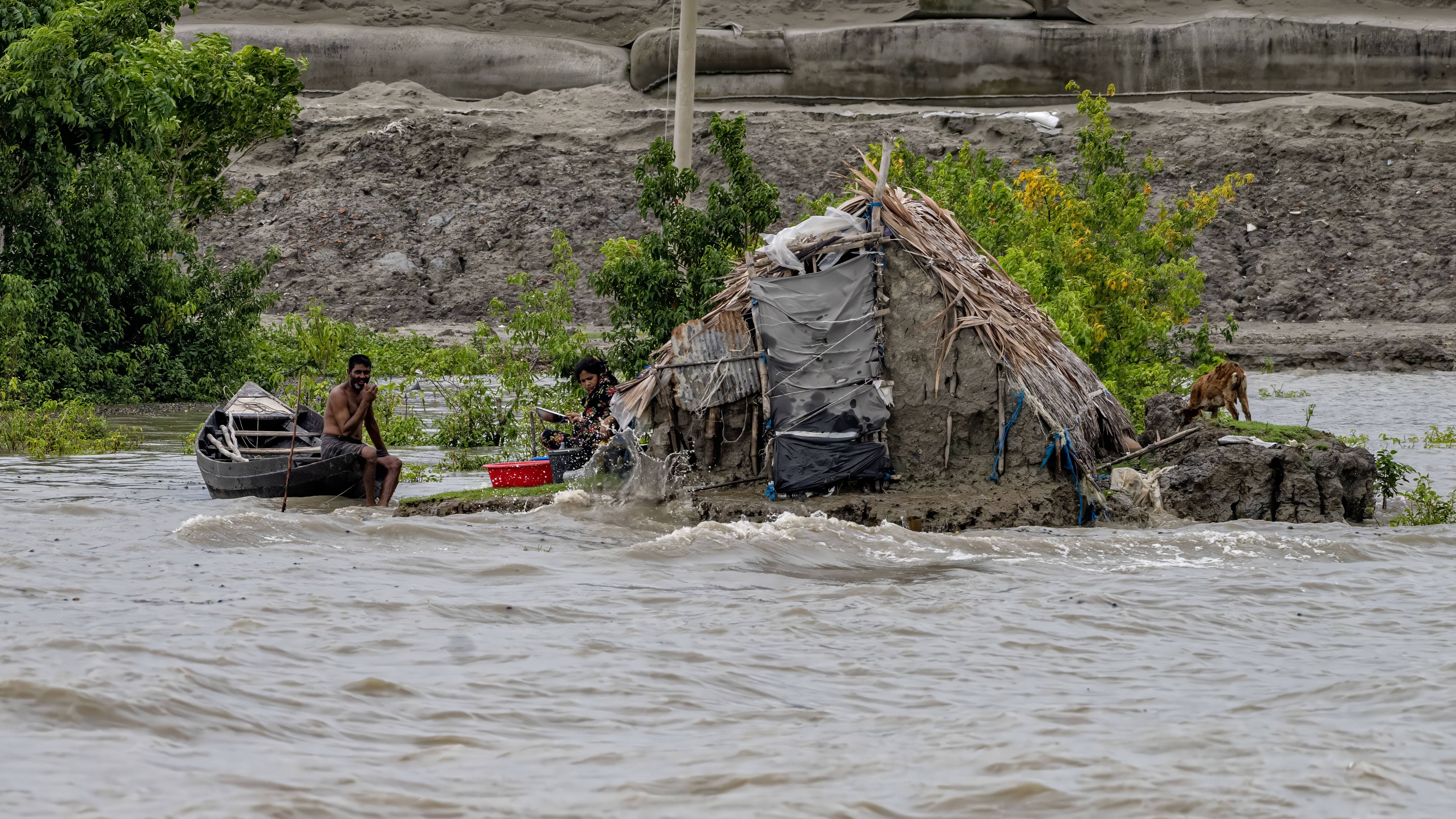GMACCC Chairman says “It is time to prepare”

GMACCC Chairman, Major General (Retd.) A.N.M. Muniruzzaman, President of the Bangladesh Institute of Peace and Security Studies (BIPSS) and, Nathalie Chuard, Director of the Geneva Centre for Security Sector Governance (DCAF) were among the panellists in the COP 29 side event on "Serving in the Storm: Strengthening National Security Institutions to Provide Accountable and Effective Security for the State and Its Peoples During the Climate Crisis,"
Collective action and innovative solutions are essential to navigating the unprecedented security impacts of climate change
Baku, Azerbaijan, 15 November 2024
GMACCC Chairman, Major General (Retd.) A.N.M. Muniruzzaman, President of the Bangladesh Institute of Peace and Security Studies (BIPSS), was invited as a distinguished speaker at COP29, held in Baku, Azerbaijan. This pioneering event, titled "Serving in the Storm: Strengthening National Security Institutions to Provide Accountable and Effective Security for the State and Its Peoples During the Climate Crisis," focused on the intersection of climate change and Security Sector Reform and Governance (SSR&G), drawing significant global attention to this critical issue.
The event which was jointly hosted by the UN and The Geneva Centre for Security Sector Governance (DCAF) brought together key stakeholders and experts to address the urgent need for adaptation and mitigation strategies to tackle the growing security challenges posed by climate change. Speaking on the issue, UN Secretary-General warned, “We are out of road and time.” Major General Muniruzzaman emphasized the necessity for the security sector to proactively evaluate and analyze the impending threats posed by the climate crisis. He stressed the importance of preparing security institutions to meet these challenges head-on.
He spoke about the security sector and its need to adopt sustainable, "green" practices. He also emphasized the urgent need for the establishment of a global ‘Green-SSR’ Fund and the development of national security institutions in global south to provide effective and sustainable security during climate-induced crises.
Major General Muniruzzaman issued a powerful call to action, urging global leaders and security stakeholders to recognize the climate crisis as a pressing security challenge. “It is time to prepare,” he said, emphasizing that collective action and innovative security solutions are essential to navigating the unprecedented security impacts of climate change.
He emphasized the necessity for the security sector to proactively evaluate and analyze the impending threats posed by the climate crisis. He highlighted the disproportionate vulnerability of countries like Bangladesh, which faces a growing threat of climate-induced migration, resource conflicts, and heightened disaster risks. “Bangladesh is on the frontline of the climate crisis, and our security institutions must adapt quickly to ensure the safety and resilience of our people,” he stated.

Fight till the end. A climate refugee family were fighting against the odds to survive someway as the rising water level was about to wash away their last place of residence in Mongla of Bagerhat district, Bangladesh. Photo by Asker Ibne Firoz, 4 August 2023. Licensed under the Creative Commons Attribution-Share Alike 4.0 International license.
He further discussed the global military’s role as a contributor to emissions, noting that military operations are responsible for 5.5% of global greenhouse gas emissions. He stressed that this figure underrepresents the true impact, as it does not fully account for emissions from ongoing conflicts and wartime activities. “This highlights the urgent need for militaries worldwide, including in Bangladesh, to adopt sustainable and green practices to mitigate their environmental footprint,” he added.
Addressing the global south, Major General Muniruzzaman advocated for the establishment of a ‘Green-SSR’ Fund to assist in greening security institutions, particularly in vulnerable regions like South Asia. He also called for international support to strengthen national security institutions in Bangladesh and other developing nations to effectively manage climate-induced crises. “Bangladesh, with its experience in disaster management, can serve as a model for integrating climate adaptation with security strategies,” he remarked.
As Bangladesh grapples with rising sea levels, intensified natural disasters, and potential food and water crises, the call for resilient and sustainable security institutions resonates deeply. Major General Muniruzzaman’s participation at COP29 highlights the critical role that Bangladesh can play in shaping the climate related global security strategies in the age of climate change.